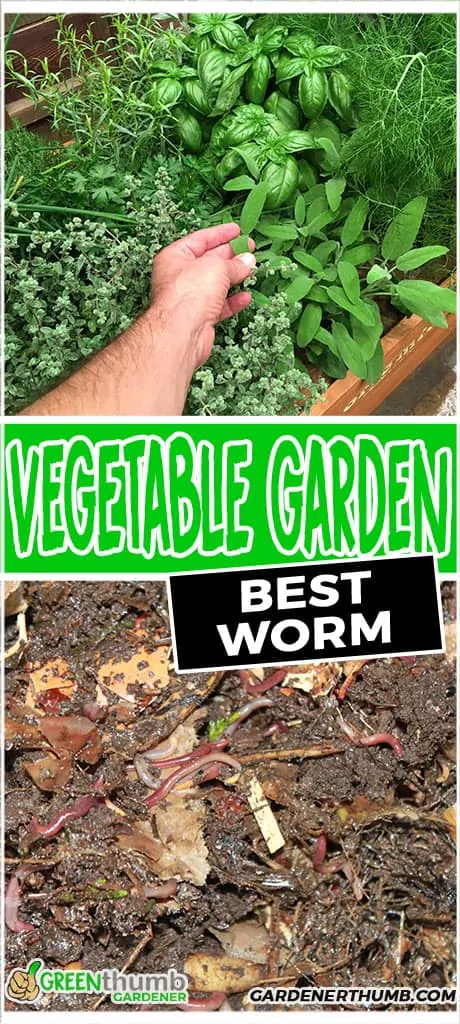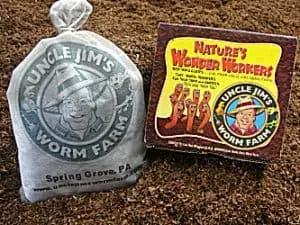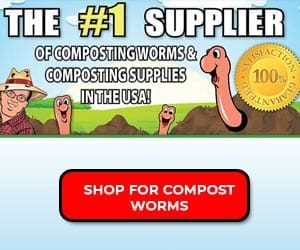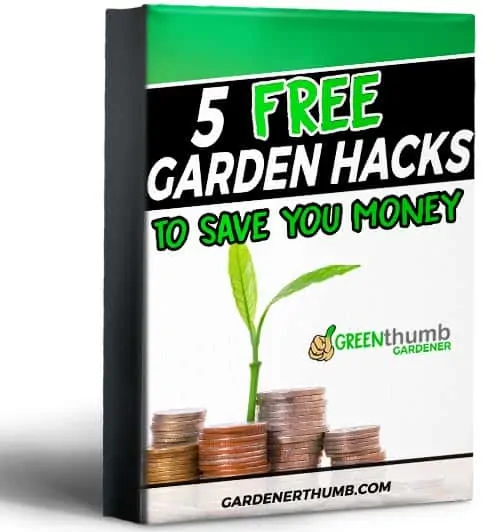Best Worms For Vegetable Garden Guide
Last Updated 9/18/20
Growing my vegetable garden was fun at first until I started seeking ways to attract worms to the garden. It was not easy at first because I always felt that the best worms for gardens are the biggest ones such as nightcrawlers.
I know that for me to keep my vegetable garden going, I need to do the right thing and do it fast. This pushed me to study more on what are the best worms for a vegetable garden.
This lead led me to the homes of other smaller worms such as the red wigglers which are unrelenting workers in conditioning the garden.
Green thumb Gardener occasionally links to product and/or services offered by vendors to assist you with all your gardening needs. Some of these may be affiliate links, meaning we earn a small commission if items are purchased.
Want to Download a Garden Hack Guide for FREE
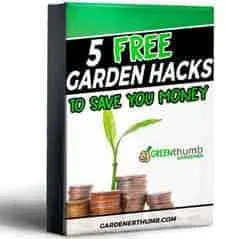
Enter your email below and we will send you a guide to help you SAVE money in your garden.
Why Worms Are Beneficial For Your Garden
I suspect that most gardeners, at some point, ask for a bit of help in the garden. But we are mostly not aware of the help that is right before us in the place of worms. Worms are so familiar to us that we often take them for granted.
Anyone who works or owns a garden sees the earthworm as the gardener’s best friends. It is seen as nature’s first gardeners.
Adding worms to a vegetable garden is a fundamental organic practice that would be beneficial to your garden and help you grow a healthy vegetable garden.
These benefits include:
Create Humus
Worms help to create humus in your garden. The hummus is seen to be a dark brown-black type of soil that helps to hold essential nutrients for each plant’s use and growth.
Soil Structure
Worms are great and indefatigable workers that help to create a good soil structure due to their burrowing activities.
The worms burrowing activities helps to open up the soil and create drainage channels and aeration
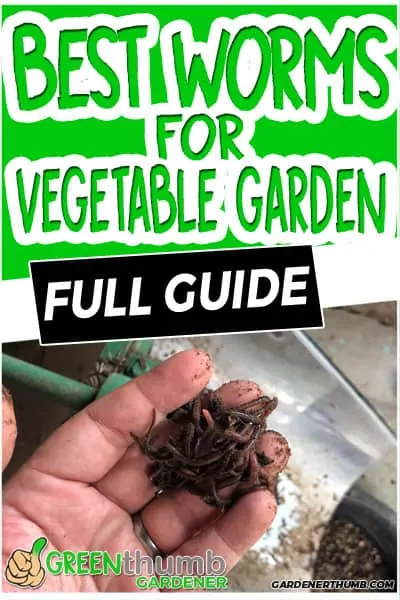
Breakup Hardpan
Worms are unpaid garden workers that help to break up hardpan and dense soil that are uncomfortable for plant roots. Most worms such as the earthworms can burrow as deep as 5-6 feet in the soil.
Improves Drainages
Worms help to do a lot of dirty jobs for you in the garden. With their burrowing and channeling, worms can help to loosen up the soil to improve the drainage and increase the aeration
Types of Worms You Can Add To Vegetable Garden
When introducing worms into the vegetable garden, it is important to know that not all worms are beneficial to the vegetable garden.
Some of the right worms that you can introduce to your garden should include
Lumbricus Terrestris
These are known to be the largest species of worms that can be found anywhere in the world. They are also known as the anecic worm or commonly called earthworms and ranges from 20-25 cm.
These worms feed on dead leaves of plants and can also feed on feces and dead insects. There are good sources of burrowing for the vegetable garden
Allolobophora Caligninosa
These types of worms are also known as grey worms and mostly seen in the U.K. These worms are beautiful and attractive. It comes with three different shades of colors on the front.
This type of worm mostly feeds on soils that are rich in organic matter and mostly lives in burrows of topsoil.
Lumbricus Rubellus
This is another enormous worm that is beneficial to your garden. It is also known as red earthworms with a size of 25mm to 105mm.
The worm body comprises a non-transparent and smooth reddish part. This unique type of worm prefers to stay in soil with high organic matter and feed mostly on the organic matter with a high decomposition level.
Green thumb Gardener occasionally links to product and/or services offered by vendors to assist you with all your gardening needs. Some of these may be affiliate links, meaning we earn a small commission if items are purchased.

Need Red Wriggler Worms?
- Live compost worms ship to your door
- #1 supplier of Composting supplies
- Uncle Jim’s is our source for worms
Eudrilus Eugeniae
These are known as African Nightcrawlers and are domiciled in tropical West Africa but can now be seen in a different warm region of the world.
Perionyx Excavatus
These types of worms are commercially produced, also known as blue or Indian blue. There are composting worms that are popular as a result of the ease of them to make fast worm castings.
These attractive looking worms come in two different colors which include a purple head and a reddish-brown hind.
They perform better in tropical and subtropical regions.
Amynthas Gracilis
This type of worm comes in brown or pink colors. They can grow up to 4-6 inches long and do well in warm weather.
These worms help to increase the porosity of the soil while increasing the ease of water circulation in the soil.
Eisenia Fetida
These worms are mostly seen in Europe but with the advent of technology, there are now easily cultivated all over the world. There are known by different names such as Tiger worm, Red Californian earthworm, the Brandling worm, The Panfish worm and the Red worm.
Other names of which these worms are known as include Trout worm, Red wiggler worm etc. These worms are mostly used to decay domestic and industrial waste.
They are mostly used in rotting compost, veggies and manure.
Eisenia Hortensis
This is a species of worms that are commonly known as the European Nightcrawlers. The worms are medium-sized and are Pink Grey, Blue body color.
You can find these types of worms in deep woodland litters or garden soils that are rich in organic matter. These worms do well in a compost pit and one of the best worms for vegetable gardens.
Best Ways to Add Worms to Your Garden
Introducing worms to a vegetable garden can take different ways and forms. As a gardener, it is essential to understand these simple steps and this includes
Use of Cornmeal or Manure
- Sprinkle some cornmeal of about 1-2 pounds on some parts of your raised garden
- With the aid of a shovel, mix well the cornmeal with the topsoil of the raised bed
- Keep the moisture level high by watering the area but not too wet
- Allow for a month to enable bacteria to grow in that area as that will be beneficial to the activities of the worm
- Remember always to add a pound of cornmeal every 14 days
- Note that in the absence of cornmeal, you can make use of organic matter like manure or compost
- The organic matters help to attract earthworms
Bagging Method
This is another very simpler method that even a novice can use in attracting worms. The processes include
- Purchase a cheap bag of organic manure
- Make a slit on the body of the bag
- Place the slit manure bag in a shady place
- Remember to put the side of the bag slit side down.
- Make sure that you carry out the activity during autumn
- This action will allow the bag of manure to be filled with worms and its offspring during spring
- Transfer the worms to your raised bed garden already filled with compost.

Further Reading
Tips to Care For Your Garden Worms
As a gardener, it does not just end in introducing worms into the vegetable garden for them to start casting. It also involves taking care of the worms to enable them to survive.
A healthy and happy worm will lead to a green garden. In caring for this natural garden guest, it is important that they are fed well with items found within the home and the environment kept conducive.
To feed the worms, you should take the following steps.
1. Worms can be feed using vegetable scraps and raw fruits
2. Worms enjoy plant-based materials that are low in salt
3. It is important to continue to add cornmeal, coffee grounds and manure or compost every two weeks
4. Also, make sure that you feed the worm with natural fibers such as linen or cotton
5. Remember that it does not just end in the feeding of the worm but also involves keeping them in a good environment. Most worms prefer warm temperature, and that is why it is ideal for introducing them during spring.
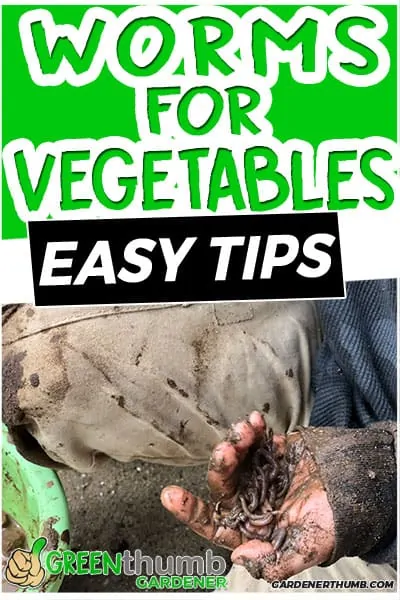
It is therefore very important to keep the garden soil fully moisturized at a temperature of 20-30 degree Celsius.
Not just any type of worms, but those that particularly feed on decomposing organic matter as food for their survival.
Interestingly, worms can also help in breaking down the nutritional elements contained in the soil to make it easier for your plants to absorb them for their survival.
You Can Even Order Worms Online
- Great Composting Worm
- Includes instructions on how to add to your compost bin
- Guaranteed Alive
Final Thoughts
Why waste your money looking for more technical and expensive ways of adding nutrients to your vegetable garden when your friendly guest can be introduced and taking care of without much ado.
Just provide them with leftovers and a warm environment and see them work your garden without any other payment or wage bills.
Related Questions
1. Should I put worms in my vegetable garden?
Yes, worms are essential for vegetable gardens as it helps to provide variable nutrients to plants as a result of the waste these worms excrete
2. When should I add worms to my garden?
Worms should be added to the garden but not before the soil compaction is broken up and all the concrete and rubble removed.
3. How do I keep worms out of my vegetable garden?
To keep unwanted worms out of the vegetable garden, you can attract predators such as birds, amphibians and other insects to make a meal out of these unwanted worms such as cutworms or their larvae.
You can also reduce or stop watering of the garden as a moisture soil is a heaven for these worms.
4. Can a garden have too many worms?
Yes, a garden can have too many worms in the soil due to excess worm castings that are too full of nutrients.

